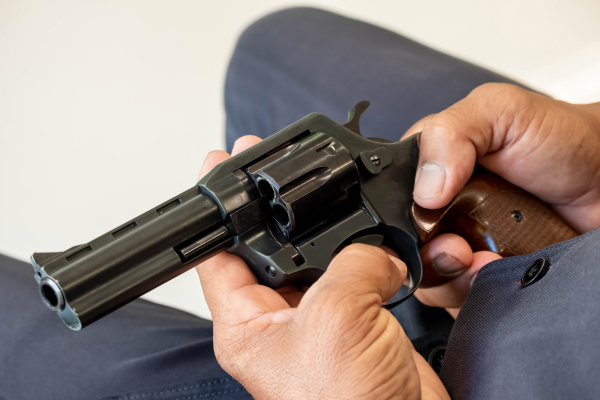
Accidental gun discharges are a serious issue for firearm owners and those nearby. These incidents happen when a gun fires unintentionally, often causing injuries or damage.
The causes include mechanical failures, reckless handling, or not following basic safety rules. These accidents can lead to property damage, emotional trauma, or even fatalities.
Good Guys Injury Law helps victims of accidental discharges understand their rights and seek justice. Whether caused by a mechanical malfunction or negligent discharge, our team works to hold responsible parties accountable. Knowing the causes and risks of accidental firearm discharge is key to preventing such incidents.
Table of Contents
What is Accidental Gun Discharge?
An accidental gun discharge occurs when a firearm fires unintentionally. This can happen for many reasons, such as mechanical failure, careless handling, or improper storage. These incidents are dangerous and often lead to unintentional firearm injuries or even fatalities.
Firearm owners are responsible for using and storing guns safely. Even a momentary lapse in attention can cause accidents.
Following basic safety rules, like keeping a loaded gun pointed in a safe direction, can help prevent accidents. Knowing what causes an accidental discharge is the first step toward safer gun ownership.
Common Scenarios Leading to Accidental Gun Discharges
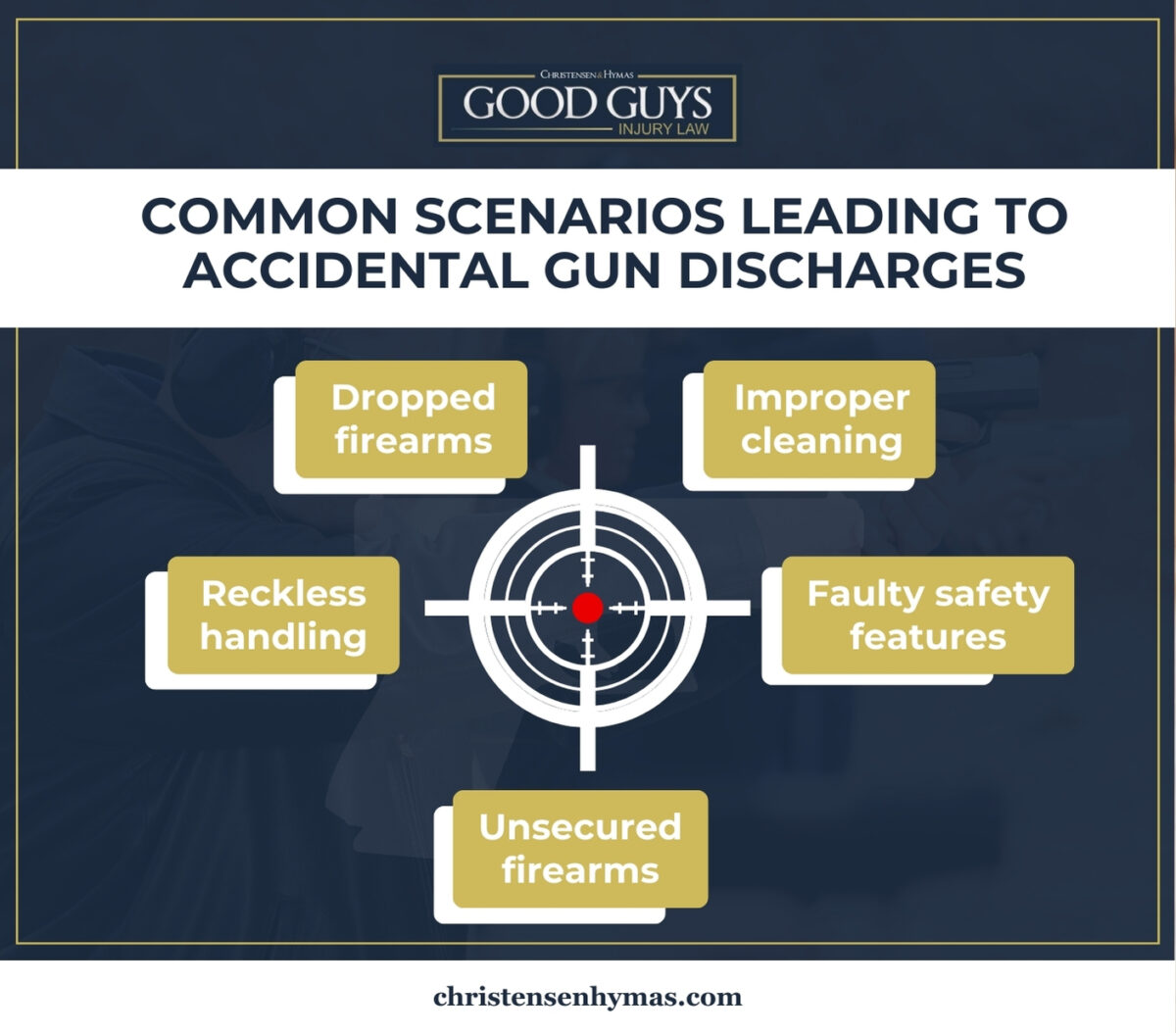
- Dropped firearms: Guns that fall to the ground can fire if not secured properly.
- Improper cleaning: A gun can fire if the trigger mechanism is touched during cleaning.
- Reckless handling: Waving or pointing a loaded gun carelessly puts others at risk.
- Faulty safety features: A mechanical defect in the safety lock can cause a gun to fire.
- Unsecured firearms: Leaving guns out where children or others can reach them leads to accidents.
Legal and Safety Consequences of Gun Discharges
- Injuries and medical costs: Unintentional discharges can hurt people, leading to high bills for medical attention.
- Property damage: A gun firing accidentally can damage walls, furniture, or other items.
- Legal consequences: Gun owners may face fines or charges for reckless endangerment if someone is hurt.
- Loss of trust: Accidents can make others feel unsafe around the person responsible.
- Need for insurance claims: Victims may need to file insurance claims to recover costs for medical treatment, property damage, or lost income caused by the accident.
Causes of Accidental Gun Discharges
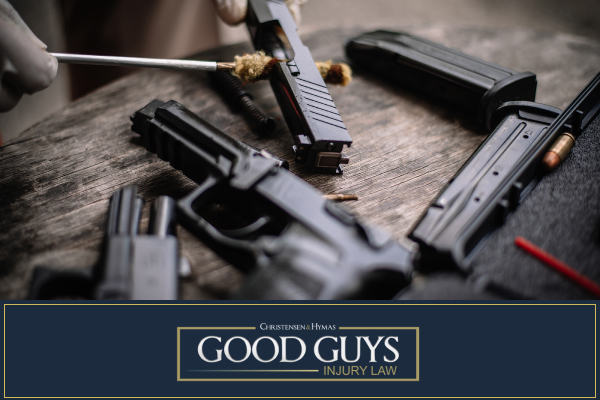
Accidental gun discharges happen for many reasons. These include problems with the gun itself, poor handling, or forgetting to use safety features. Understanding these causes helps prevent accidents. Some of the main causes are:
Mechanical Failures in Firearms
A mechanical failure happens when a gun does not work as it should. This could include a broken trigger mechanism, a faulty safety lock, or worn-out parts. Guns that are not maintained or repaired may fire unexpectedly, causing accidental discharges.
Firearm owners should check their guns regularly to ensure they are in good condition. Look for loose screws, damaged parts, or signs of wear.
If a gun has a mechanical defect, it should be fixed by a professional before use. Regular cleaning and inspections help prevent these issues and reduce the risk of accidents.
Improper Handling or Storage of Guns
Careless handling is one of the most common causes of accidental firearm discharge. Actions like waving a loaded gun, failing to point it in a safe direction, or placing a finger on the trigger can lead to accidents. Improper storage, such as leaving a gun where children can access it, also increases the risk.
To stay safe, always handle guns with care. Keep guns unloaded when not in use and store them in locked cabinets or safes.
Use trigger locks to add extra protection. Following these steps helps prevent accidental discharges and keeps everyone safer.
Failure to Engage Safety Mechanisms
Safety mechanisms are designed to prevent a gun from firing accidentally. If a gun owner forgets to use these features, accidents can happen. For example, a safety lock that is left off can cause an unexpected firing if the gun is bumped or dropped.
To avoid this, always check that the safety lock is engaged before handling or storing a gun. Many modern firearms have additional safety features, like trigger locks or grip safeties.
Learning how to use these properly is key to preventing accidents. A few seconds to double-check can save lives and prevent injuries.
Types of Injuries Caused by Accidental Gun Discharges
Accidental gun discharges can cause serious harm. Injuries may affect the person handling the gun, bystanders, or even property. These accidents often require medical care and can lead to long-term physical or emotional effects. Some of the common types of injuries include:
Physical Injuries to Victims or Bystanders
Accidental gun discharges often result in unintentional firearm injuries. These can range from minor cuts to severe wounds that require immediate medical attention. Bystanders are also at risk, especially in crowded areas or when a firearm is mishandled.
Common physical injuries include damage to limbs, head injuries, or internal wounds caused by a bullet. These injuries can lead to permanent disabilities or even loss of life. Quick action, like calling for emergency help, is crucial to minimize harm.
Preventing these accidents requires careful gun handling and strict adherence to gun safety rules. By always keeping a gun pointed in a safe direction and using proper storage, many of these injuries can be avoided.
Psychological Trauma and Long-Term Effects
Accidental gun discharges don’t just cause physical harm. They can also lead to emotional and mental trauma. Both the gun owner responsible and the victim may experience stress, guilt, or anxiety after an incident. In severe cases, people may develop post-traumatic stress disorder (PTSD).
These emotional effects can last for years, affecting daily life and relationships. Victims may feel unsafe around guns, while the person responsible may struggle with feelings of regret. Counseling or therapy can help address these issues and support recovery.
Preventing accidental discharges not only protects physical safety but also avoids the lasting emotional toll such incidents bring.
Damage to Property or Surroundings
When a gun fires accidentally, it can cause property damage in addition to physical injuries. Bullets can break windows, furniture, or even walls, leading to costly repairs. In some cases, damage may occur to cars, buildings, or other valuable items in the area.
Firearm owners may also face legal or financial consequences for this damage. Home insurance policies might cover some costs, but the process can be lengthy and stressful.
To prevent property damage, always store guns unloaded and use safety locks. Following these simple steps reduces the chance of a dangerous accident.
Preventing Accidental Gun Discharges
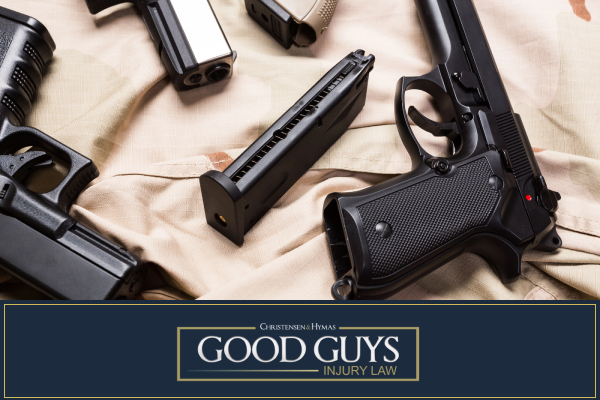
Preventing accidental gun discharges starts with responsible gun ownership. Following basic steps can reduce the risk of injuries, deaths, or damage. Here are simple ways to stay safe:
- Keep guns unloaded when not in use: Always remove bullets when storing a gun. This step prevents unintentional discharges.
- Use safety features: Engage the safety lock on every firearm. This small action prevents accidents.
- Store guns securely: Keep guns in a locked safe, away from children or untrained people. Use trigger locks for extra security.
- Learn proper gun handling: Take a course on gun safety to become familiar with handling and maintaining firearms safely.
- Inspect equipment regularly: Check guns for mechanical failure or wear before use. Fix any problems immediately.
These practices protect everyone and make gun ownership safer.
Legal Implications of Accidental Gun Discharges
An accidental firearm discharge can lead to serious legal problems. Firearm owners may face penalties under 18 U.S.C. § 924(c) if their actions are considered careless. Depending on the situation, there could be fines, lawsuits, or even criminal charges.
Understanding local laws and following safety rules can help avoid these legal consequences. A few of the key legal issues include:
Liability for Negligence in Gun Ownership
Gun owners are legally responsible for using and storing their firearms safely. If an accidental discharge happens due to carelessness, they can be held accountable for reckless handling. This includes failing to secure a loaded gun or ignoring safety rules.
Injuries caused by negligence may lead to lawsuits or criminal charges. Courts may rule that the owner is liable for damages, including medical costs, property damage, and emotional harm.
To avoid these problems, firearm owners should follow safety practices, inspect guns regularly, and secure them properly. Responsible actions can prevent accidents and serious legal consequences.
Consequences of Injuries or Death Caused by Discharges
- Injuries: Victims of accidental discharges may suffer severe wounds, requiring surgery and long recovery periods.
- Unintentional firearm deaths: Fatalities caused by accidents often result in criminal charges for reckless endangerment or negligence.
- Property damage: A single shot can destroy valuables or even entire structures, creating high costs for repairs.
- Legal action: Victims or families can file lawsuits for compensation, holding the gun owner responsible.
- Emotional impact: Both victims and the person responsible may face lasting guilt, stress, or trauma.
Role of Insurance and Compensation for Victims
Insurance can play an important role after an accidental firearm discharge. Homeowner or liability policies may cover medical bills, repair costs, or other expenses caused by the accident. Victims often rely on this compensation to recover financially.
However, insurance may not always cover full damages, especially in severe cases. Filing a claim can be complex, and legal help may be needed to get fair compensation. Firearm owners should review their policies to know the coverage. Responsible actions and proper insurance provide protection for both victims and gun owners.

Contact Our Utah Personal Injury Lawyer for a Free Case Consultation
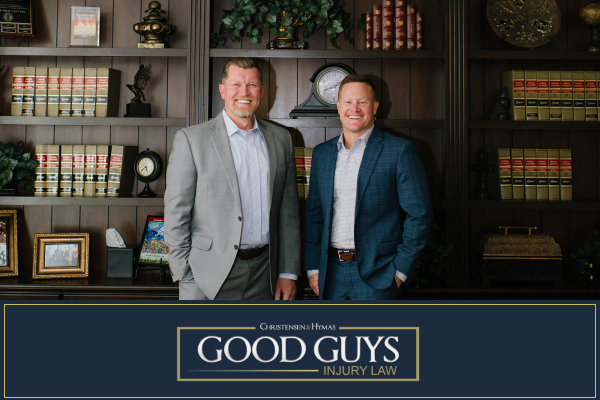
An accidental firearm discharge can cause life-changing injuries, emotional trauma, or financial loss. Victims and their families may face high medical bills, lost income, and long-term challenges. In addition, gun owners involved in these incidents may deal with serious legal ramifications, including lawsuits or criminal charges.
Good Guys Injury Law helps victims seek justice and fair compensation. Our experienced team understands the legal issues surrounding gun accidents and works to protect your rights.
Whether you are a victim seeking support or a gun owner needing guidance, we are here to help. Contact us today for a free consultation to discuss your case and learn your options.
